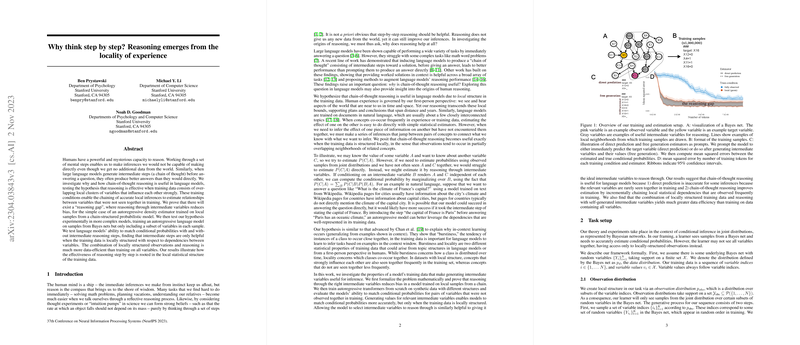Overview
In an intriguing paper unfolding from Stanford University, researchers explore the mechanics of reasoning. They probe into why stringing together a series of inferences—akin to reasoning through steps—can enhance our understanding and lead to better decisions, despite the absence of additional data. The paper scrutinizes the efficacy of reasoning in understanding the world around us and resolves whether similar processes enhance the performance of LLMs.
The Hypothesis
At the core of the paper lies a hypothesis: reasoning in LLMs is potent when the training involves data that clusters around local, strongly interrelated variables. This mirrors human cognition, where experiences are often confined to the immediate surroundings yet inform decisions impacting distant objectives. The paper postulates that LLMs, quite similarly, are fed on text data redolent with adjacent themes and are thus adept at processing closely tied concepts. However, when making leaps between less frequently paired information, LLMs and humans alike benefit from delineating a pathway through associated deductive steps.
Mathematical Insights
The paper doesn’t simply assert intuitions; it steepens its hypothesis in mathematical rigor. For the analytically inclined, it proves a "reasoning gap" through the lens of autoregressive density estimators—a class of statistical models. In essence, reasoning through a chain of intermediate variables minimizes estimation bias, a finding illuminated by a formal proof in the context of a simplified Bayes' net structure. Supplementing this proof are controlled experiments using synthetic datasets to emulate local structures, which confirmed that intermediate reasoning indeed bridges gaps in data relationships not directly observable in training.
Real-world Implications and Conclusion
What does all this mean in practical terms? The research projects illuminating real-world implications for AI development. Constructing data-driven models that reflect the 'locality' principle akin to clustering of human experiences could enable AI to reason with increased deftness, similar to a human navigating through a complex thought process. Experimentally, such AI models are shown to match conditional probabilities more accurately, embodying a form of efficiency that could catalyze significant advancements in understanding and fostering reasoning in artificial intelligence. This exploration charts a path for future inquiries into the fusion of local observations, reasoned AI responses, and efficient AI training, remarkably informing the cognitive emulation landscape within the AI sphere.
